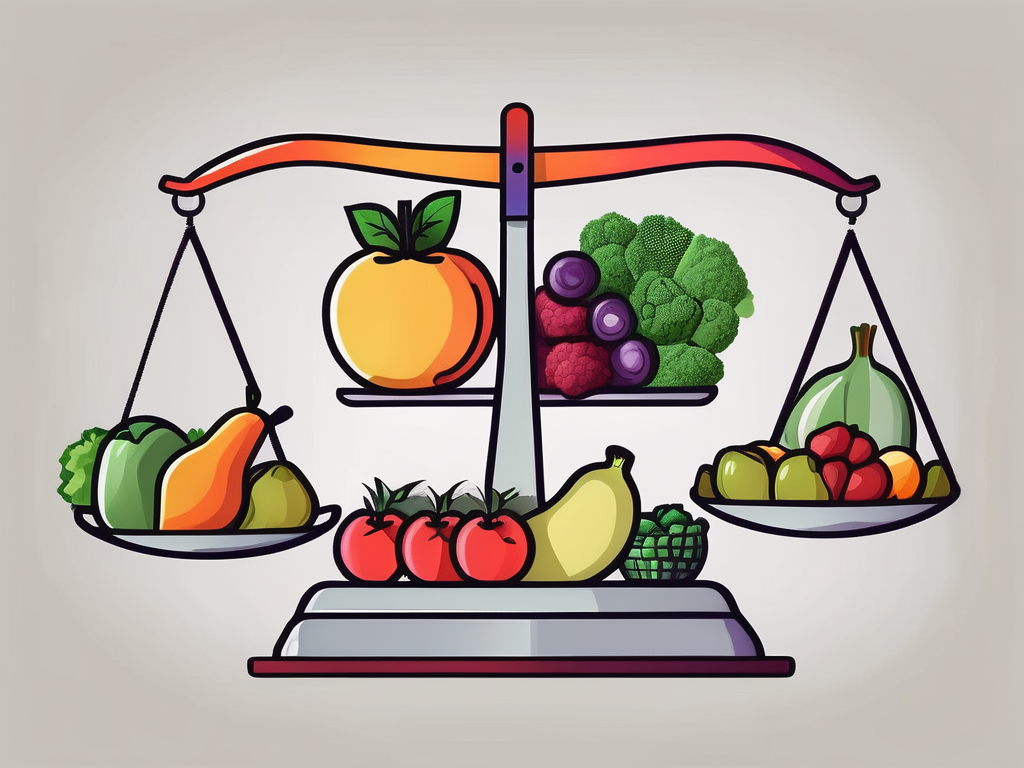
In today's society, weight loss has become a prevalent topic as people strive to achieve their health and wellness goals. While many focus solely on shedding pounds, it's important to recognize that weight loss management goes beyond the number on the scale. It involves developing sustainable habits, particularly in the realm of healthy eating. By understanding the science behind weight loss, embracing key principles, and exploring strategies for cultivating healthy eating habits, individuals can overcome challenges and reap the long-term benefits of adopting a balanced approach to food.
Understanding Weight Loss Management
Weight loss management is a holistic approach to achieving and maintaining a healthy body weight. It encompasses various factors, including dietary changes, physical activity, and behavior modification. By focusing on sustainable lifestyle practices rather than quick fixes, weight loss management promotes the development of healthy eating habits that can be maintained over time.
When embarking on a weight loss journey, it is essential to understand that there is no one-size-fits-all approach. Each individual's body is unique, and what works for one person may not work for another. Therefore, it is crucial to tailor weight loss strategies to suit personal preferences, lifestyle, and health goals. Consulting with healthcare professionals, such as dietitians or nutritionists, can provide personalized guidance and support in developing an effective weight loss management plan.
The Science Behind Weight Loss
Weight loss occurs when there is a caloric deficit, meaning that the body burns more calories than it consumes. This deficit can be achieved through a combination of reduced calorie intake and increased physical activity. When the body is in a calorie deficit, it begins to utilize stored fat as a source of energy, resulting in weight loss.
Furthermore, understanding the role of macronutrients, such as carbohydrates, proteins, and fats, in the weight loss process is crucial. Each macronutrient plays a unique role in the body, and balancing their intake is essential for overall health and weight management. For example, proteins are vital for muscle repair and growth, while carbohydrates provide energy for daily activities. By incorporating a balanced mix of macronutrients into meals, individuals can support their weight loss goals while ensuring optimal nutrition.
Key Principles of Weight Loss Management
Successful weight loss management is built upon a foundation of key principles that guide individuals in their journey towards healthier eating habits. These principles include portion control, mindful eating, regular meal planning, and embracing a balanced diet. By incorporating these principles into their daily lives, individuals can establish sustainable and effective weight loss strategies.
In addition to dietary changes, physical activity is a crucial component of weight loss management. Regular exercise not only helps burn calories but also improves overall health and well-being. Incorporating a combination of cardiovascular exercise, strength training, and flexibility exercises can help individuals achieve their weight loss goals while enhancing their fitness levels. Finding enjoyable forms of physical activity, such as dancing, hiking, or yoga, can make exercise more sustainable in the long run. If you're looking for expert guidance and support in your weight loss journey, consider consulting a weight loss doctor NJ for personalized strategies and advice tailored to your needs.
The Connection Between Weight Loss Management and Healthy Eating
Weight loss management and healthy eating go hand in hand. A nutritious diet not only supports weight loss efforts but also provides the essential nutrients needed for optimal health and well-being.
When embarking on a weight loss journey, it is crucial to understand the intricate relationship between food choices and overall well-being. Healthy eating habits not only contribute to shedding excess pounds but also play a significant role in preventing chronic diseases such as diabetes, heart disease, and obesity. By fueling the body with nutrient-rich foods, individuals can boost their metabolism, increase energy levels, and improve their overall quality of life.
The Role of Nutrition in Weight Loss
Nutrition plays a vital role in weight loss management. By focusing on consuming nutrient-dense foods, individuals can get the necessary vitamins, minerals, and macronutrients while still maintaining a calorie deficit. This ensures that the body is receiving the nourishment it needs to function optimally while promoting weight loss.
Furthermore, incorporating a diverse range of foods into one's diet not only aids in weight management but also supports overall health. Foods rich in antioxidants, fiber, and healthy fats can help reduce inflammation, boost immunity, and support digestive health. By prioritizing whole, unprocessed foods, individuals can create a sustainable and effective approach to weight loss that prioritizes long-term health benefits.
How Weight Loss Encourages Balanced Eating
Weight loss management often prompts individuals to reassess their eating habits and make healthier choices. By placing an emphasis on portion control, incorporating a variety of fruits, vegetables, lean proteins, and whole grains, individuals can avoid excessive calorie intake and develop a well-rounded, balanced approach to eating.
Moreover, weight loss can serve as a catalyst for exploring new culinary experiences and discovering innovative ways to prepare nutritious meals. Experimenting with different cooking techniques, flavors, and ingredients can make the journey towards weight loss more enjoyable and sustainable. By cultivating a positive relationship with food and embracing a diverse range of flavors, individuals can transform their approach to eating and achieve lasting success in their weight loss endeavors.
Strategies for Cultivating Healthy Eating Habits
Cultivating healthy eating habits is a fundamental aspect of weight loss management and long-term success. By implementing strategies that promote mindful eating, such as slowing down during meals, paying attention to hunger and fullness cues, and practicing portion control, individuals can establish a healthy relationship with food.

One important aspect of cultivating healthy eating habits is understanding the nutritional value of the foods we consume. By educating ourselves on the benefits of different food groups, such as the importance of incorporating fruits and vegetables for essential vitamins and minerals, individuals can make informed choices that support their overall well-being.
Mindful Eating for Weight Management
Mindful eating involves being fully present during meals and paying attention to the physical sensations and emotions related to food consumption. By savoring each bite, eating slowly, and listening to the body's hunger and satiety signals, individuals can foster healthier eating habits and better manage their weight.
In addition to mindful eating, it is crucial to consider the impact of our environment on our food choices. Creating a supportive environment at home by keeping healthy snacks readily available and minimizing the presence of processed foods can significantly influence our eating habits in a positive way. Surrounding ourselves with nutritious options makes it easier to make health-conscious decisions.
Meal Planning and Prep for Healthy Eating
Meal planning and preparation are valuable tools for individuals looking to improve their eating habits. By dedicating time each week to plan and prepare nutritious meals, individuals can eliminate the reliance on convenient, unhealthy options. This enables them to make intentional choices that align with their weight loss and health goals.
Furthermore, involving friends or family in meal planning and preparation can make the process more enjoyable and foster a sense of community around healthy eating. Sharing recipes, cooking together, and exchanging meal ideas can not only strengthen relationships but also provide additional support in maintaining nutritious eating habits in the long run.
Overcoming Challenges in Weight Loss and Healthy Eating
Embarking on a weight loss journey and adopting healthy eating habits can be challenging. It's essential to address common obstacles and find effective ways to overcome them in order to sustain progress and long-term success.

One significant challenge that individuals often face when trying to lose weight and eat healthily is the overwhelming amount of conflicting information available. From fad diets to trendy superfoods, navigating through the noise can be daunting. It's important to approach weight loss and healthy eating with a critical eye, relying on evidence-based practices and seeking guidance from qualified professionals such as dietitians or nutritionists.
Another obstacle that many encounter is the lack of time and convenience when it comes to preparing nutritious meals. In today's fast-paced world, finding the time to plan and cook healthy dishes can seem impossible. However, with proper meal prepping techniques, time management skills, and a bit of creativity, incorporating healthy eating into a busy lifestyle is achievable.
Addressing Common Obstacles
Common obstacles in weight loss management include emotional eating, cravings, and social pressures. By developing coping mechanisms, seeking support from friends and family, and finding alternative ways to address emotions and stress, individuals can navigate these obstacles and maintain their commitment to healthy eating.
Moreover, understanding the root causes of emotional eating and learning to differentiate between physical hunger and emotional cravings are essential steps in overcoming this obstacle. Building a toolbox of healthy coping strategies such as mindfulness, exercise, or journaling can help individuals break free from the cycle of using food as a source of comfort.
Maintaining Motivation for Healthy Eating
Maintaining motivation is crucial throughout the weight loss journey. Setting realistic goals, tracking progress, celebrating achievements, and reminding oneself of the benefits of healthy eating can help individuals stay inspired and committed to their weight loss management plan.
In addition to individual strategies, joining a community of like-minded individuals, whether in person or online, can provide invaluable support and accountability. Sharing successes, setbacks, and tips with others on a similar journey can foster a sense of camaraderie and motivation to keep pushing forward towards a healthier lifestyle.
The Long-Term Benefits of Healthy Eating Habits
Adopting healthy eating habits yields numerous benefits, extending far beyond weight loss alone. These benefits impact both physical and mental well-being, contributing to an overall improved quality of life.

Physical Health Benefits
Healthy eating supports overall physical health by reducing the risk of chronic diseases such as heart disease, type 2 diabetes, and certain cancers. A balanced diet rich in fruits, vegetables, whole grains, and lean proteins provides the necessary nutrients to maintain optimal organ function and support a strong immune system.
Mental Health Benefits
Research consistently shows a strong connection between diet and mental health. Healthy eating habits can reduce the risk of depression and anxiety, improve cognitive function, and enhance overall mood. By fueling the body with nutritious foods, individuals can support their mental well-being and experience improved emotional resilience.
In conclusion, weight loss management goes beyond simply shedding pounds. It involves cultivating healthy eating habits that promote long-term success and overall well-being. By understanding the science behind weight loss, embracing key principles, and implementing strategies to overcome challenges, individuals can achieve sustainable results. Moreover, adopting a balanced approach to food not only supports weight loss but also provides a range of physical and mental health benefits. So, embark on your weight loss management journey today, and let healthy eating become your key to unlocking a healthier, happier you.





